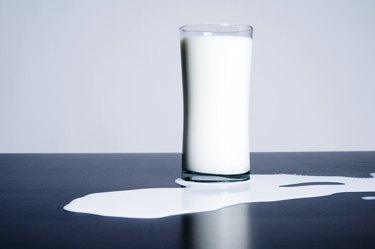
Not everyone's body is made for milk. As you age, your body's production of lactase declines. An important enzyme, lactase digests the lactose sugar in milk and other dairy products. One person has more or less lactase than the next. Some people experience such a great decline in lactase that consuming milk is unpleasant and even painful, resulting in gastrointestinal discomfort.
Animal Milk
Video of the Day
Humans are unlike many other animals on earth in that they drink the milk produced by other animals. But not all milk is alike -- different animals produce milk featuring different nutrients and compounds. Lactose is a sugar in milk that not all humans are able to process. The amount of lactose in milk varies according to the animal. Goat's milk, for example, has less lactose than cow's milk.
Video of the Day
Digestive Process
The digestive process starts in the mouth, where your slightly acidic saliva combines with milk and starts to break it down. When you swallow the milk, it travels down the esophagus and into the stomach. Gastric juices in the stomach break down the milk further and kill any living bacteria. The stomach then sends the milk into the small intestine, where nutrients -- such as amino acids, the building blocks of protein, and fatty acids, the building blocks of fat -- are absorbed. Materials that are not absorbed for energy or nutrition are pushed on to the large intestine, processed as fecal matter and released through the rectum. Waste fluids -- water carrying unwanted materials -- fill the bladder and are released as urine.
Role of Lactase
Lactase is a key enzyme in the digestion of lactose. The small intestine produces lactase. If your body only produces a small amount of lactase, you have what is called a lactose sensitivity. You can have lactose in small amounts of milk and other dairy products, but you experience pain and discomfort if you consume too much. If the small intestine doesn't process lactose, it moves on to the large intestine, where bacteria ferment the sugar, producing carbon dioxide. The result is gas, bloating, cramping and diarrhea.
Lactose Intolerance
Lactose intolerance is a common condition. According to a September 2009 article in "USA Today," as much as 60 percent of the world's population is unable to process the lactose in animal milk. Researchers theorize the ability to drink animal milk is an adaptation that has occurred at different rates among different societies around the world. While most individuals of northern European descent are able to drink cow's milk, almost no Native Americans report the ability to process the lactose sugar.